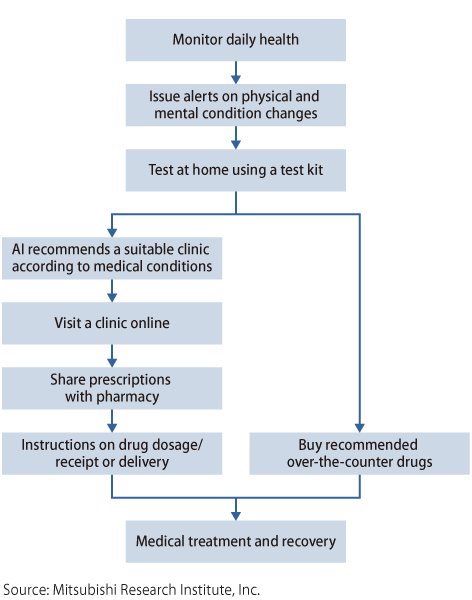In April 2020, the ban on phone and online medical services and remote instruction on dosage and administration was lifted*1 due to the spread of coronavirus disease 2019 (COVID-19). Through medical institutions and pharmacies that provide these services, patients can now receive medical services and drug delivery at home. Living in what is called a post-COVID-19 era, online medical services, which had been limited to certain uses until recently, are expected to spread rapidly.
Present online medical services are restricted in various ways, including having communication limited to audio and video, being unable to fully use all five senses, and the unavailability of blood sampling, X-rays, and other diagnostic tests. These challenges are expected to be solved with the progress of technology. A series of potential test technologies that can be utilized in online medical services are being developed and commercialized, including haptics technology, which converts object softness during palpation into data; stethoscopes that can assist in diagnosing heart diseases by collecting ECG data together with sound data; quick test kits that are simple and easy to use; and liquid biopsies, which can detect cancer from just one drop of blood. The spread of online medical services and technological progress are expected to change the relationship between patients and hospitals in the following manner:
(1) Without the necessity of having to physically go to the hospital, patients will be able to choose from among doctors across the country to find one that suits them.
(2) Wearable devices and inspection kits will become commonplace, and users will be able to acquire mental and physical health data by themselves.
(3) The use of artificial intelligence (AI) to improve health, detect illness at an early stage, and treat diseases will become common.
At stage (1), online medical services will become widely used, and at stage (2), the home will become a clinic. With stage (3), AI systems will be able to detect signs of deterioration in health from daily records, and issue alerts to support medical services in improving health and detecting the causes of diseases early on (Figure). Patients will no longer search for hospitals after realizing they are not feeling well.
Beyond stage (3), physical extension technologies, such as robot prostheses and avatar humanoid robots, will likely become popular, which will completely change our concept of health. For example, if your robot prostheses is not well, it will have to undergo maintenance not unlike a visit to the doctor. What is increasingly clear is that the future provision of medical services will change both our understanding and management of health.
Present online medical services are restricted in various ways, including having communication limited to audio and video, being unable to fully use all five senses, and the unavailability of blood sampling, X-rays, and other diagnostic tests. These challenges are expected to be solved with the progress of technology. A series of potential test technologies that can be utilized in online medical services are being developed and commercialized, including haptics technology, which converts object softness during palpation into data; stethoscopes that can assist in diagnosing heart diseases by collecting ECG data together with sound data; quick test kits that are simple and easy to use; and liquid biopsies, which can detect cancer from just one drop of blood. The spread of online medical services and technological progress are expected to change the relationship between patients and hospitals in the following manner:
(1) Without the necessity of having to physically go to the hospital, patients will be able to choose from among doctors across the country to find one that suits them.
(2) Wearable devices and inspection kits will become commonplace, and users will be able to acquire mental and physical health data by themselves.
(3) The use of artificial intelligence (AI) to improve health, detect illness at an early stage, and treat diseases will become common.
At stage (1), online medical services will become widely used, and at stage (2), the home will become a clinic. With stage (3), AI systems will be able to detect signs of deterioration in health from daily records, and issue alerts to support medical services in improving health and detecting the causes of diseases early on (Figure). Patients will no longer search for hospitals after realizing they are not feeling well.
Beyond stage (3), physical extension technologies, such as robot prostheses and avatar humanoid robots, will likely become popular, which will completely change our concept of health. For example, if your robot prostheses is not well, it will have to undergo maintenance not unlike a visit to the doctor. What is increasingly clear is that the future provision of medical services will change both our understanding and management of health.
*1:Ministry of Health, Labour and Welfare. "Temporary / special case treatments including medical services using phone and other communication devices during COVID-19 pandemic" (April 10, 2020)
Figure: Future online medical care and consultation behavior

